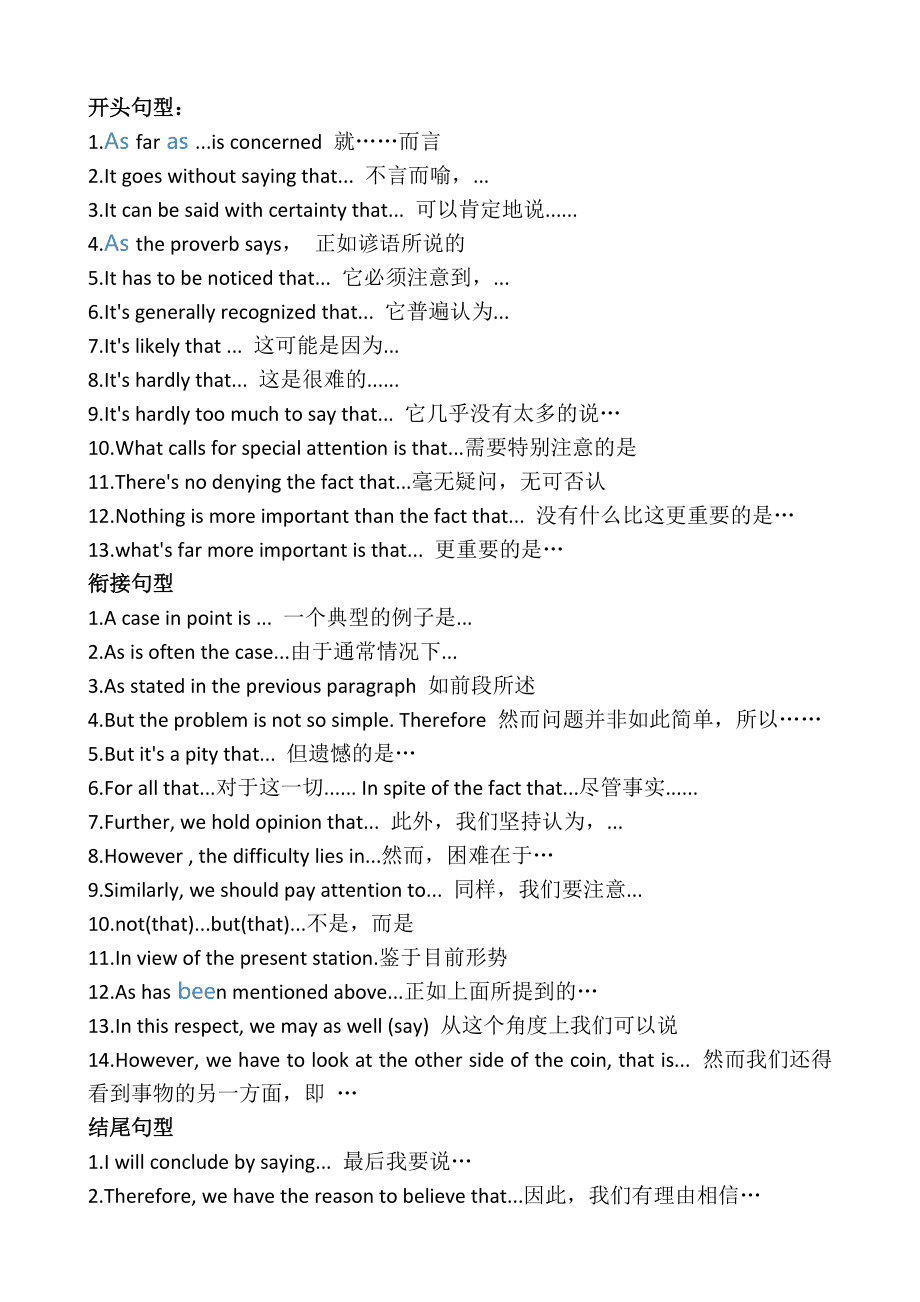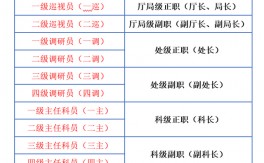英語(yǔ)作文高級(jí)句型
英語(yǔ)作文中使用高級(jí)句型可以提升文章的表達(dá)力和學(xué)術(shù)性,以下是一些常用的高級(jí)句型:
1. 使用復(fù)雜結(jié)構(gòu):
- Not only does this approach solve the immediate problem, but it also lays the groundwork for future developments.
- This theory is not only applicable to this case, but it can also be extended to other scenarios.
2. 使用從句:
- Although the task was challenging, he managed to complete it on time.
- Despite the fact that she was new to the team, she contributed significantly to the project.
3. 使用非謂語(yǔ)動(dòng)詞:
- Having finished the homework, he went out to play.
- To achieve the goal, many sacrifices must be made.
4. 使用強(qiáng)調(diào)句型:
- It is the lack of resources that hinders our progress.
- What surprised me most was how quickly she adapted to the new environment.
5. 使用被動(dòng)語(yǔ)態(tài):
- The book was written by a famous author.
- The problem will be discussed in the next meeting.
6. 使用比較級(jí)和最高級(jí):
- This is the most interesting book I have ever read.
- She is more experienced than anyone else on the team.
7. 使用條件句:
- If we had more time, we could have done a better job.
- Should you need any help, please do not hesitate to contact us.
8. 使用虛擬語(yǔ)氣:
- If I were you, I would take the opportunity.
- He acted as if he had never been there before.
9. 使用并列句:
- He is not only intelligent but also hardworking.
- We need to work harder and smarter to achieve our goals.
10. 使用插入語(yǔ):
- He, however, did not agree with the proposal.
- The plan, in my opinion, is not feasible.
11. 使用倒裝句:
- Only after the meeting was over did he realize his mistake.
- Not until the problem was solved did they leave the room.
12. 使用獨(dú)立主格結(jié)構(gòu):
- The game over, the players left the field.
- The work done, they went home.
13. 使用強(qiáng)調(diào)句中的“do”:
- Do make sure you understand the instructions before you start.
- She does have a point when she says that we need to improve our efficiency.
14. 使用名詞性從句:
- What we need to do next is to analyze the data.
- The fact that she won the competition surprised everyone.
15. 使用副詞性從句:
- Wherever you go, take an umbrella with you.
- Although he is old, he is still very active.
使用這些高級(jí)句型時(shí),要注意語(yǔ)法的正確性,確保句子的意思清晰且準(zhǔn)確。不要過(guò)度使用,以免文章顯得過(guò)于復(fù)雜或不自然。

英語(yǔ)作文30句萬(wàn)能金句
英語(yǔ)寫(xiě)作中使用一些通用的、高質(zhì)量的表達(dá)可以提升文章的流暢度和表達(dá)力。以下是一些常用的英語(yǔ)作文金句,這些句子可以用于各種類型的英語(yǔ)寫(xiě)作中,包括議論文、說(shuō)明文、敘事文等:
1. It is universally acknowledged that...(眾所周知...)
2. With the development of society, we have to face the problem of...(隨著社會(huì)的發(fā)展,我們不得不面對(duì)...的問(wèn)題。)
3. It is imperative that...(...是必要的。)
4. There is no denying that...(不可否認(rèn)...)
5. It goes without saying that...(不言而喻...)
6. There is no doubt that...(毫無(wú)疑問(wèn)...)
7. Nowadays, it is common to hear/see...(如今,常常聽(tīng)到/看到...)
8. It is generally believed that...(人們普遍認(rèn)為...)
9. Many people insist that...(很多人堅(jiān)持認(rèn)為...)
10. A lot of people seem to think that...(很多人似乎認(rèn)為...)
11. It is widely accepted that...(被廣泛接受...)
12. In my opinion/view, we should...(在我看來(lái),我們應(yīng)該...)
13. As far as I am concerned, ...(就我而言,...)
14. From my perspective, ...(從我的視角來(lái)看,...)
15. It is often said that...(人們常說(shuō)...)
16. It can be easily proved that...(可以很容易地證明...)
17. No one can deny that...(沒(méi)有人能否認(rèn)...)
18. It is self-evident that...(這是顯而易見(jiàn)的...)
19. To be frank/honest, I think...(坦白地說(shuō),我認(rèn)為...)
20. To start with, ...(首先,...)
21. To sum up, ...(總的來(lái)說(shuō),...)
22. In conclusion, ...(總之,...)
23. As a result, ...(結(jié)果,...)
24. Consequently, ...(...)
25. Therefore, ...(...)
26. Thus, ...(...)
27. As has been mentioned above, ...(如上所述,...)
28. In view of the present situation, ...(鑒于目前的情況,...)
29. For instance/example, ...(例如,...)
30. Furthermore, ...(...)
使用這些句子時(shí),確保它們與你的文章內(nèi)容相關(guān),并且能夠增強(qiáng)你的觀點(diǎn)或論點(diǎn)。記住,過(guò)度使用這些句子可能會(huì)讓你的文章顯得機(jī)械和不自然,所以應(yīng)該適度地使用它們。
英語(yǔ)萬(wàn)能開(kāi)頭和結(jié)尾
在英語(yǔ)寫(xiě)作中,一個(gè)好的開(kāi)頭可以吸引讀者的注意力,而一個(gè)有力的結(jié)尾則可以給讀者留下深刻印象。以下是一些常見(jiàn)的英語(yǔ)寫(xiě)作開(kāi)頭和結(jié)尾的萬(wàn)能句式:
開(kāi)頭句式:
1. 引人入勝的開(kāi)頭 - "Have you ever wondered how...?"
2. 背景介紹 - "In recent years, the issue of... has become increasingly important."
3. 引用名言 - "As [Name] once said, '...'"
4. 提出問(wèn)題 - "Why is it that...?"
5. 統(tǒng)計(jì)數(shù)據(jù) - "According to recent studies, approximately...% of..."
6. 故事講述 - "Once upon a time, in the bustling city of..."
7. 定義 - "By definition, a [noun] is..."
8. 對(duì)比和對(duì)比 - "While some argue that..., others believe that..."
9. 現(xiàn)象描述 - "In the realm of..., one cannot ignore the fact that..."
10. 直接陳述 - "This essay aims to explore the reasons behind..."
結(jié)尾句式:
1. 總結(jié) - "In conclusion, the evidence clearly shows that..."
2. 強(qiáng)調(diào)重要性 - "It is imperative that we continue to explore the implications of..."
3. 提出建議 - "Therefore, it is recommended that..."
4. 呼吁行動(dòng) - "Let us all take a step towards..."
5. 展望未來(lái) - "Looking ahead, the future of... seems promising."
6. 重申觀點(diǎn) - "To reiterate, the importance of... cannot be overstated."
7. 結(jié)束語(yǔ) - "With these thoughts in mind, we can move forward with a better understanding of..."
8. 提出問(wèn)題 - "What remains to be seen is whether..."
9. 引用名言 - "As [Name] wisely noted, '...'"
10. 開(kāi)放性結(jié)尾 - "The question now is, where do we go from here?"
記住,這些句式是通用的,但最重要的是要根據(jù)你的寫(xiě)作內(nèi)容和風(fēng)格來(lái)調(diào)整它們,以確保它們與你的文章主題和論點(diǎn)相匹配。

 微信掃一掃打賞
微信掃一掃打賞











